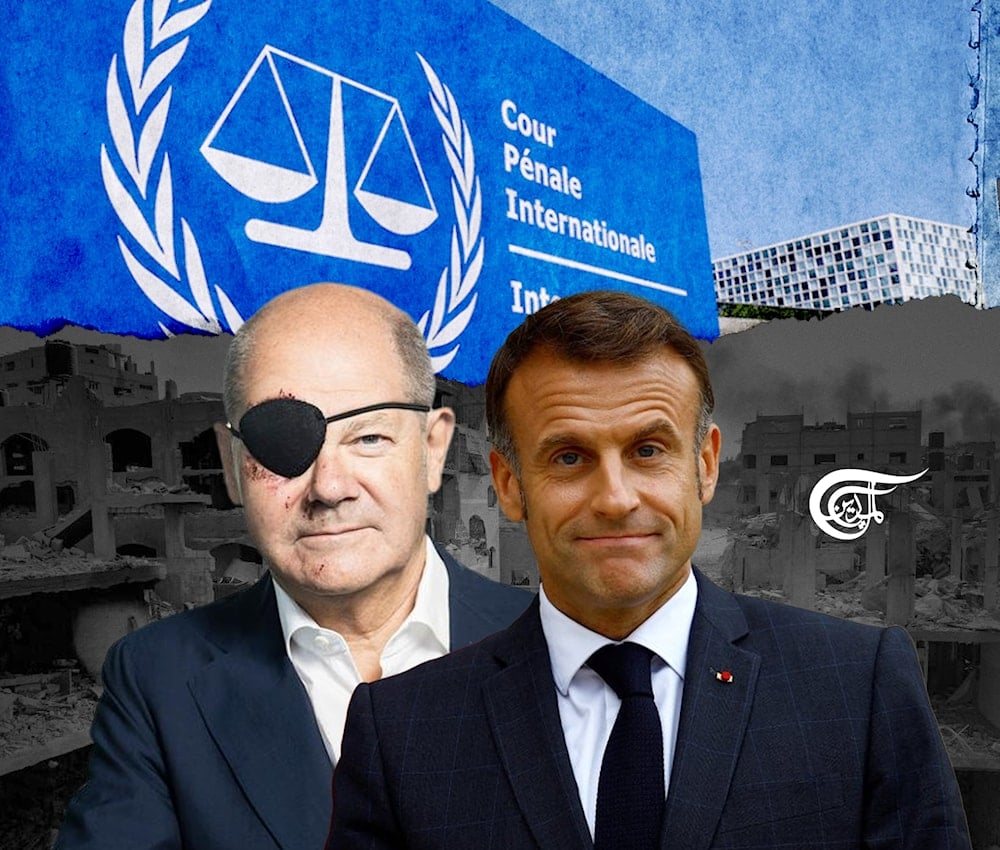Why EU unity on the International Criminal Court is a farce
The EU’s lack of unity shows that it will apply international law to challenges of its own choosing, revealing glaring double standards on Western rights protections and those of the Palestinian people.
-

Several EU states continue to prioritize their brazen support for Israeli war crimes over commitments to the ICC and rights protections. (Al Mayadeen English; Illustrated by Mahdi Rtail)
ICC “decisions are binding on all States party to the Rome Statute, which includes all EU Member States,” said European Union Vice President Josep Borrell recently.
This came as the top court issued arrest warrants for war criminals Benjamin Netanyahu and former occupation Security Minister Yoav Gallant. As members of the top court, all EU states are compelled to enforce the order. However, the double standards are clear as day: countries hail their membership of the court but are increasingly divided on putting their commitment into action.
Look to Germany and France. Berlin has the nerve to claim that the ICC order is insufficient to facilitate an arrest. What this really means is turning a blind eye to numerous war crimes and crimes against humanity committed by occupation leaders over a period of at least seven months. Rather than maintaining a clear-cut stance against genocidal atrocities, Berlin is pushing empty rhetoric on the ICC’s work, claiming to honor and respect it. But that narrative has few takers, considering Germany’s reprehensible selectivity in honoring orders.
Consider the ICC arrest warrant against Russian President Vladimir Putin in March last year: Germany was quick to raise the alarm that the global community had a responsibility to act on the order, touting that “international criminal law works.” But what about international law in "Israel’s" mass slaughter campaign in Palestine, a recognized ICC state whose territory was the site of unspeakable Israeli war crimes? Germany claims middle-ground on the ICC order when frankly there is none: either Berlin fulfills its legal compulsion of arresting and handing over both war criminals to the ICC, or refuses to do so.
Paris is now suddenly reminded of legal complications if Netanyahu entered French territory. It is trying to play both sides by claiming rhetorical support for the ICC while downplaying arrest warrants as formalized accusations. Facts speak for themselves: these arrest warrants concern justice for thousands of Palestinians massacred with impunity. Arresting Netanyahu and Gallant also means Germany and France will have to deliver in the interests of Palestinians. But faux sympathy dominates these countries. Look no further than the French Foreign Ministry’s artificial concern for the ‘protection of civilians in Gaza’ and an end to humanitarian mayhem without fixing responsibility on "Israel". EU’s divergent approach to the ICC warrants leaves no doubt about Western hypocrisy on rights, justice, and above all – Gaza.
But make no mistake. Germany and France’s criticism of the ICC reflects deliberate ill-intent, not merit. For instance, EU nations that believe in swift enforcement are not holding back on the warrants. Consider Spain: it was clear that the genocide of the Palestinian people would not go “unpunished". A major difference between Madrid, Berlin, and Paris is consistent support for justice. For instance, Spain has backed the International Court of Justice (ICJ) case against "Israel", called out its illegal occupation, and recognized Palestinian statehood in the face of vile Zionist propaganda. On the other hand, Germany has ramped up arms exports to the occupation, shielded blatant war crimes, and defended Israel’s genocidal atrocities at the ICJ.
Thus, with such pro-genocidal support evident on the world stage, countries such as Germany cannot be trusted to promote accountability for Palestinian blood and lives. Other EU states, such as Spain and Ireland, face no such barriers because they have called out "Israel’s" murderous campaign in Gaza for what it is. "There are international arrest warrants for (Netanyahu) and (Yoav Gallant). There are decisions confirming Israel’s war crimes and humanitarian violations. What more does the Spanish government need to cancel these licenses?," said Ana Sanchez, spokesperson for the Civil Society Network for Solidarity Against the Occupation of Palestine (RESCOP), which is organizing protests across Spain this week.
Interestingly, the EU’s divergent stance on warrants makes several realities clear. First, this is not a bloc that genuinely believes in the uniform application of the rule of law. After all, the warrants concern the murder, persecution, and starvation of Gaza residents, and both Gallant and Netanyahu are chiefly responsible for depriving the population of survival necessities. Thus, the EU’s lack of unity shows that it will apply international law to challenges of its own choosing, revealing glaring double standards on Western rights protections and those of the Palestinian people.
Second, the EU shows few signs of bolstering the ICC’s mandate in the face of "Israel’s" mass slaughter campaign. For instance, arrests are key to ensuring trials before the ICC. The entire world should witness the extent of brutality, mass killings, and destruction spearheaded by Netanyahu and Gallant. But protection of occupation crimes appears to be the dominant theme in several European countries, including France, Germany, Italy, and the United Kingdom. All four countries agreed to omit any mention of these warrants in the recent Group of Seven (G7) foreign ministers communique, effectively aligning their interests with Washington and undermining swift accountability for the genocidal regime.
Thus understood, several EU states continue to prioritize their brazen support for Israeli war crimes over commitments to the ICC and rights protections. By downplaying the magnitude of atrocities committed against the Palestinians, they offer a pulse of a bloc deeply complicit in the genocide.

 Hannan Hussain
Hannan Hussain
 5 Min Read
5 Min Read











